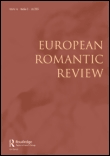
European Romantic Review
Scope & Guideline
Connecting Past and Present through Romantic Literature
Introduction
Aims and Scopes
- Interdisciplinary Approaches to Romanticism:
The journal encourages research that intersects with various disciplines, including philosophy, history, visual arts, and science, reflecting the multifaceted nature of Romantic literature. - Exploration of Gender and Identity:
A consistent focus on themes surrounding gender, identity, and social justice can be seen, highlighting the contributions of women and marginalized voices in the Romantic tradition. - Cultural and Political Contexts:
The journal examines the cultural and political dimensions of Romantic literature, analyzing how texts respond to and shape the sociopolitical landscape of their time. - Ecocriticism and Environmental Studies:
An increasing emphasis on ecocriticism and the relationship between literature and nature demonstrates the journal's commitment to exploring Romanticism's environmental implications. - Historical and Textual Analysis:
A rigorous historical and textual analysis underpins much of the journal's scholarship, emphasizing the importance of context in understanding Romantic works.
Trending and Emerging
- Social Justice and Activism:
Papers addressing themes of social justice, abolitionism, and the political implications of Romantic literature are on the rise, indicating a growing interest in how literature engages with contemporary issues of equity and activism. - Ecocriticism and Romantic Environmentalism:
There is a notable increase in works that explore Romanticism's relationship with nature and ecological concerns, reflecting a broader trend in literary studies to engage with environmental issues. - Interdisciplinary and Cross-Cultural Studies:
Emerging themes include interdisciplinary approaches that draw from fields such as science, philosophy, and cultural studies, as well as cross-cultural comparisons that examine Romanticism in a global context. - Psychological and Physiological Perspectives:
Recent publications have shown an interest in psychological and physiological readings of Romantic texts, exploring themes such as emotion, mental health, and bodily experiences in the literature of the period. - Digital Humanities and Romantic Studies:
The integration of digital humanities methodologies into Romantic studies is becoming more prominent, allowing for innovative analyses and the exploration of new forms of engagement with Romantic texts.
Declining or Waning
- Traditional Canonical Texts:
There appears to be a diminishing focus on traditional canonical texts in favor of more diverse and marginalized voices, suggesting a shift towards inclusivity and broader representation in Romantic studies. - Purely Formalist Studies:
Research centered solely on formalist approaches, such as strict metrics or aesthetic evaluations, seems to be less prevalent, as scholars increasingly seek to contextualize works within broader cultural and historical frameworks. - Romanticism as a Homogeneous Movement:
The idea of Romanticism as a singular, cohesive movement is being challenged, with less emphasis on generalizations and more on the unique and varied expressions of Romanticism across different regions and contexts.
Similar Journals

KEATS-SHELLEY JOURNAL
Delving into the Heart of Romantic IdealsKEATS-SHELLEY JOURNAL, published by the Keats-Shelley Association of America, Inc., serves as a pivotal scholarly platform dedicated to the study of Romantic literature, with a particular focus on the works and influence of John Keats and Percy Bysshe Shelley. As a respected publication within the field, the journal is currently ranked in the Q2 category of Literature and Literary Theory for 2023, reflecting its significance in advancing literary scholarship. This journal has provided insights and critical discussions from 2002 to 2011, and intermittently from 2013, 2016, and 2018 to 2021, though coverage has been discontinued in Scopus. Despite its traditional publication model, the journal remains a vital resource for researchers, professionals, and students interested in the Romantic period and its lasting impact on contemporary literary discourse. The editorial board prioritizes high-quality research contributing to the understanding of literary themes, historical contexts, and critical interpretations relevant to Keats and Shelley, making it an essential reading for anyone engaged in Romantic studies or literary theory.
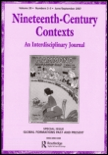
Nineteenth-Century Contexts-An Interdisciplinary Journal
Decoding the Past: Where Literature Meets CultureNineteenth-Century Contexts: An Interdisciplinary Journal is a pivotal academic publication that serves as a vital resource for scholars and students engaged in the exploration of the complex cultural, literary, and social dimensions of the nineteenth century. Published by Routledge Journals, Taylor & Francis Ltd, this journal holds a position within the Q2 and Q3 quartiles in the fields of Literature and Literary Theory and Cultural Studies respectively, illustrating its significance and relevance in contemporary research. Since its inception in 1987, it has fostered interdisciplinary dialogue and examination of the era's rich contexts, featuring articles that weave together historical, literary, and cultural analyses. Although the journal does not currently offer an open access model, its rigorous peer-review process guarantees scholarly integrity and quality. Housed in the United Kingdom, it caters to a global audience, thereby attracting diverse perspectives and insights, making it an essential publication for anyone looking to deepen their understanding of the complexities of the nineteenth century.

QUADERNI URBINATI DI CULTURA CLASSICA
Bridging Disciplines for a Deeper Understanding of CultureQUADERNI URBINATI DI CULTURA CLASSICA is a distinguished academic journal dedicated to the interdisciplinary exploration of Classics, Linguistics, and Literary Theory. Published by ACCADEMIA EDITORIALE PISA-ROMA, this journal serves as a vital scholarly platform for researchers and professionals alike, facilitating in-depth discussions and analyses that contribute to these evolving fields. With an ISSN of 0033-4987 and an E-ISSN of 1724-1901, it boasts a robust Scopus ranking, placing it within the second quartile in Classics and the third quartile in related disciplines as of 2023. Although it is not an open-access journal, QUADERNI URBINATI DI CULTURA CLASSICA remains essential for those engaged in the study of language, literature, and classical cultures, encouraging scholarly exchange and innovation from its base in Rome, Italy. Researchers and students will find valuable insights and methodologies within its pages, making it a key resource for fostering academic growth and understanding.

GIORNALE STORICO DELLA LETTERATURA ITALIANA
Fostering Insight into Italy's Literary JourneyGIORNALE STORICO DELLA LETTERATURA ITALIANA is a distinguished journal published by CASA EDITRICE LOESCHER that serves as a critical platform for the exploration and analysis of Italian literary history. With an ISSN of 0017-0496, this journal encompasses a broad spectrum of topics within the field of literature and literary theory, contributing to the academic dialogue surrounding Italy's rich literary heritage. Although it is not openly accessible and has discontinued its coverage in Scopus since 2021, the journal has established its presence in the scholarly community, being ranked in the 18th percentile within the literature and literary theory category. Its historical significance and focus on literature position it as an essential resource for researchers, professionals, and students keen on deepening their understanding of Italian literature and its impact on cultural studies. By engaging with the contents of this journal, readers will gain valuable insights into the evolution of literary discourses and the role of Italian literature in contemporary society.
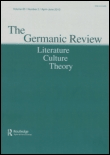
GERMANIC REVIEW
Redefining Boundaries in the Study of Germanic Languages and CulturesGERMANIC REVIEW, published by Routledge Journals, Taylor & Francis Ltd, stands as a prominent academic journal dedicated to the study of Germanic languages, literature, and cultural studies. With an ISSN of 0016-8890 and an E-ISSN of 1930-6962, this journal has been a valuable resource for researchers and scholars since its inception, encompassing a wide range of topics within its field. Despite its Q4 ranking in Cultural Studies and Q3 ranking in Literature and Literary Theory, the journal has grown steadily in reputation, with Scopus ranks placing it within the competitive landscape of Arts and Humanities. The journal publishes contributions that delve into historical and contemporary issues, fostering a deeper understanding of Germanic cultures. By bridging literary analysis with cultural discourse, GERMANIC REVIEW invites academics, professionals, and students alike to engage with critical themes and methodologies that redefine the boundaries of Germanic studies. As a subscription-based journal, it remains dedicated to promoting scholarly communication and advancing knowledge in the humanities.

NEOPHILOLOGUS
Exploring the Depths of Language and Literary TheoryNEOPHILOLOGUS, published by Springer, stands as a pivotal journal in the fields of Linguistics and Language as well as Literature and Literary Theory. With an illustrious history dating back to 1916 and continuing through various phases until 2024, this journal has entrenched itself as a crucial platform for scholarly discussion and research dissemination. NEOPHILOLOGUS is recognized for its high academic standards, as evidenced by its impressive category quartiles, ranking in the Q2 tier for Linguistics and Language and Q1 for Literature and Literary Theory as of 2023. Notably, it ranks in the 81st percentile for Arts and Humanities in the Scopus database, underscoring its significant contribution to the humanities discourse. While the journal does not currently offer open access options, it remains a valuable resource for researchers, professionals, and students seeking in-depth analyses and insights within its specialized domains. Based in Dordrecht, Netherlands, NEOPHILOLOGUS invites contributions that advance our understanding of linguistic and literary phenomena, ensuring its relevance and impact in these dynamic fields.
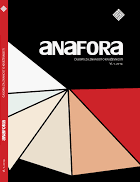
Anafora
Connecting scholars worldwide through open-access research.Anafora is an essential open-access journal published by the University of Osijek, Faculty of Humanities & Social Sciences, contributing to the dynamic fields of Communication, Cultural Studies, and Literature and Literary Theory. Since its inception in 2014, the journal has committed itself to disseminating innovative research and critical analysis, attracting a diverse array of scholars and practitioners from across the globe. Based in Croatia, Anafora's content is accessible to all, fostering inclusivity and collaboration within academia. While the journal currently holds a Q4 ranking in both Communication and Cultural Studies, and a Q3 in Literature and Literary Theory as of 2023, its growth trajectory indicates a promising future for the contributions it gathers. Researchers, students, and professionals alike are encouraged to engage with this platform to explore the multifaceted aspects of human expression and cultural discourse, thereby enriching the scholarly conversation within these pivotal domains.
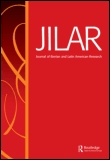
Journal of Iberian and Latin American Research
Advancing scholarly dialogues in cultural and literary landscapes.Journal of Iberian and Latin American Research, published by Routledge Journals, Taylor & Francis Ltd, is a key resource for scholars interested in the rich cultural, literary, and sociopolitical landscapes of Iberian and Latin American contexts. With an ISSN of 1326-0219 and an E-ISSN of 2151-9668, this journal is dedicated to advancing research from 1995 to 2008 and continuing between 2010 and 2023, reflecting the evolving dynamics in these regions. Notably esteemed within its field, it holds a Q3 categorization in Cultural Studies and a Q2 rating in Literature and Literary Theory as of 2023. Its strong performance is underscored by its ranking within the 84th percentile in Literature and Literary Theory and engagement within interdisciplinary dialogues across various domains. While it does not offer open access, the journal remains a vital component of academic discourse, attracting researchers, professionals, and students who seek to explore the intricate narratives and theoretical frameworks that shape Iberian and Latin American studies. Whether you are delving into socio-cultural critiques or examining literary trends, the Journal of Iberian and Latin American Research is an indispensable platform for your scholarly endeavors.

LITTERATURES
Cultivating Scholarly Exchange in the HumanitiesLITTERATURES is a distinguished academic journal dedicated to the exploration of literature and literary theory, published by UNIV TOULOUSE MIRAIL. With its ISSN 0563-9751, this journal provides a platform for innovative research and critical analysis in the humanities, particularly within the field of literature. Although currently not indexed with an official e-ISSN and with a history of coverage discontinued from Scopus from 2004 to 2015, LITTERATURES continues to contribute valuable insights and scholarly discourse in contemporary literary studies. Researchers will find its publications vital for examining the intersections of literary theory and practice, while students and professionals can benefit from its rigorous academic contributions. While the journal's Scopus rank places it within the 14th percentile among literature journals, its focus on French and international literature enriches the global literary landscape and encourages meaningful scholarly exchange. The journal is based in Toulouse, France, and invites contributions that challenge existing paradigms and inspire new interpretations within the realm of literature.
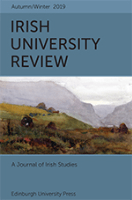
IRISH UNIVERSITY REVIEW
Nurturing Academic Excellence in Literary Theory and CriticismIRISH UNIVERSITY REVIEW is a distinguished academic journal published by Edinburgh University Press, specializing in the fields of Literature and Literary Theory. With an ISSN of 0021-1427 and an E-ISSN of 2047-2153, this journal serves as a vital platform for scholarly discourse on contemporary and historical literary studies related to Ireland and its cultural contexts. Located in the United Kingdom, the journal has achieved an impressive Q2 ranking in the 2023 category of Literature and Literary Theory, placing it in the 81st percentile among peer-reviewed arts and humanities journals globally, as per Scopus rankings. IRISH UNIVERSITY REVIEW is committed to fostering academic excellence and offers a range of access options for its readers, promoting both traditional and digital scholarship. With a publication timeline extending from 2002 to 2024, the journal is dedicated to enhancing understanding and appreciation of Irish literature through critical essays, reviews, and innovative research, making it an essential resource for researchers, professionals, and students alike.